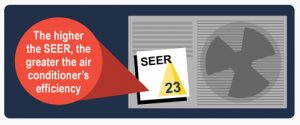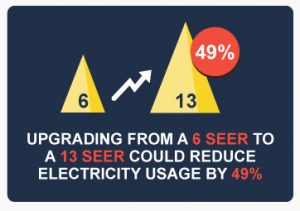HVAC energy efficiency ratings are designed to inform consumers of each system’s efficiency. When your residential HVAC unit runs effectively you can expect reduced energy costs, while keeping your home comfortable no matter what the temperature is outside.
We are here to help our residential and commercial clients in the Portland and Beaverton areas understand the different rating systems and assist in selecting the most effective HVAC unit for their unique needs.
What are Air Conditioning Ratings?
Before you begin your search for a new HVAC system, it’s important to understand the terms associated with A/C ratings. Get the details below so you can make an informed decision.
Seasonal Energy Efficiency Ratio (SEER)
SEER ratings are measured based on the cooling output, over the course of a typical cooling-season, and its relationship to the total electric energy used during the same time frame. A higher SEER rating indicates a more efficient unit, meaning reduced cooling costs on your electric bill over time. Recent federal regulations require a minimum SEER rating of 13-14 for new A/C units. ENERGY STAR certified units are required to have a minimum SEER of 14.5, making them a sufficient choice for your Portland or Beaverton home or business.
 If you have an HVAC unit that was designed prior to 2006, an upgrade will ultimately save you on energy costs. Units built prior to the Energy Policy Act of 2005 may only have a 8-9 SEER rating, which means you could be spending unnecessary dollars to keep your environment cool.
If you have an HVAC unit that was designed prior to 2006, an upgrade will ultimately save you on energy costs. Units built prior to the Energy Policy Act of 2005 may only have a 8-9 SEER rating, which means you could be spending unnecessary dollars to keep your environment cool.
Want more information? Click here to learn more about SEER ratings and how AAA Heating and Cooling can help you maximize your HVAC unit value.
Energy Efficiency Ratio (EER)
EER is a more technical way to determine energy efficiency. Similar to SEER, EER calculates an A/C unit’s efficiency, but instead of using a seasonally based measurement (SEER), EER calculates ratings based on a constant baseline.
Generally, EER ratios assume a continuous outdoor temperature of 95 degrees with a consistent indoor temp of 80 degrees with 50 percent humidity. Simply put, EER is more of an engineering rating commonly used by HVAC professionals to determine overall energy efficiency.
How Do You Select the Best Air Conditioning Unit?
As a consumer, it’s important to know the ins-and-outs of both rating systems. It’s also crucial to understand that both ratings have their limitations, as they do not take into consideration the unique needs of your home or business. In general, most consumers will find SEER ratings more informative in selecting an A/C unit. But EER ratings can be equally as helpful, as they are a tool used by HVAC installers.
To truly understand your specific cooling needs, it’s best to work with our quality, AAA Heating and Cooling HVAC contractors in the Portland and Beaverton areas. Whatever your needs, our team can assist in proper system sizing, installation, and purchasing.
Understanding Your HVAC Heating Ratings
Even though we are still enjoying our summer weather, it’s never too early to think about your heating unit. Once our temps start to dip in the approaching fall and winter months you’ll want your HVAC system in top performance to keep your home cozy.
Heating Seasonal Performance Factor (HSPF)
Much like how SEER and EER ratings gauge the cooling efficiency of an A/C unit, HSPF evaluates the efficiency of a heat pump. This measurement is used for unidirectional and bidirectional heat pumps. Fun Fact: bidirectional heat pumps provide heating in the winter and cooling in the summer.
Much like SEER ratings, a higher HSPF value means better heating efficiency. All new HVAC models are required to have an HSPF rating of 6.8, but at AAA Heating and Cooling we can help you find top-of-the-line, energy-efficient heat pump systems with a 9+ rating.
Interested in learning more about heat pumps and the best one for your needs? Check out our guide for more in depth info, or schedule an appointment with one of our HVAC contractors at our Portland or Beaverton location.
The Bottom Line
While HVAC units with higher SEER, EER, and HSPF ratings tend to be slightly more expensive, they ultimately save on energy costs. Once you invest in an energy-efficient HVAC system, don’t forget to keep up on routine maintenance, as this ensures the longevity and maximum performance of your HVAC unit.
Our professionals at AAA Heating and Cooling can help you select the best HVAC equipment and schedule standard maintenance to keep your residential or commercial system running smoothly. Our expert, dedicated team of HVAC contractors in Portland and Beaverton can assist your every need. Contact us today!